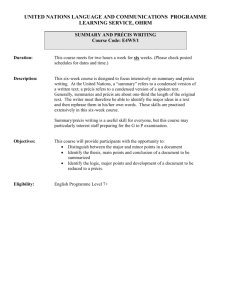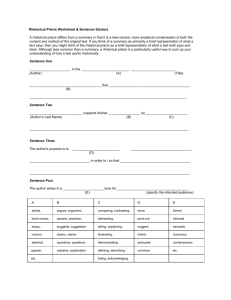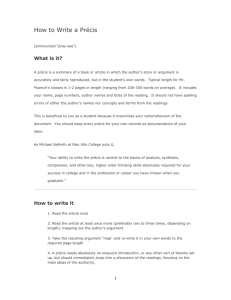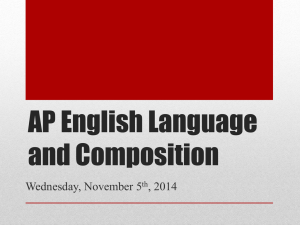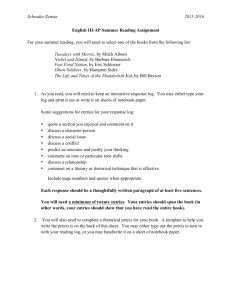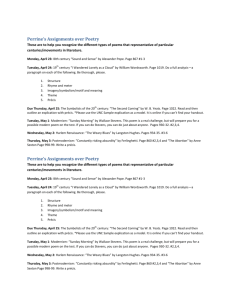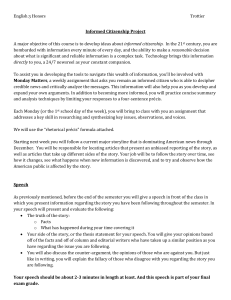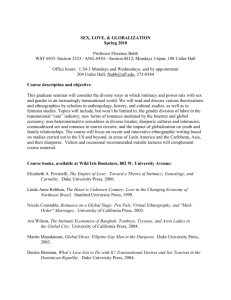INQ 120: The Moral of Our Story Roanoke College, Spring 2015
advertisement
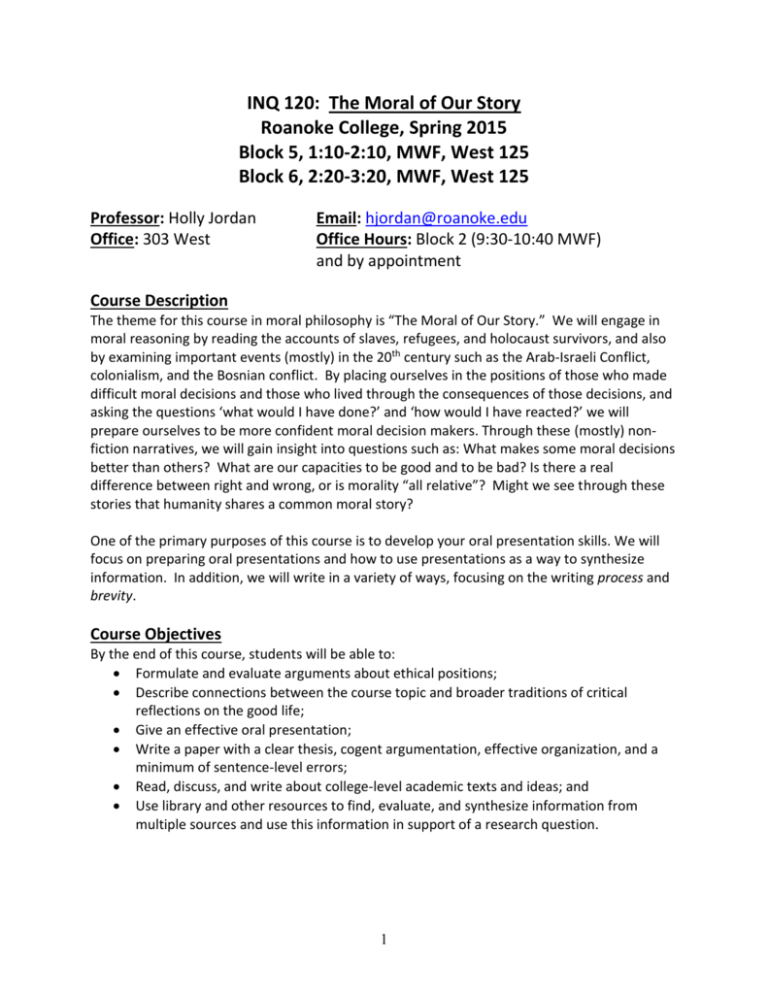
INQ 120: The Moral of Our Story Roanoke College, Spring 2015 Block 5, 1:10-2:10, MWF, West 125 Block 6, 2:20-3:20, MWF, West 125 Professor: Holly Jordan Office: 303 West Email: hjordan@roanoke.edu Office Hours: Block 2 (9:30-10:40 MWF) and by appointment Course Description The theme for this course in moral philosophy is “The Moral of Our Story.” We will engage in moral reasoning by reading the accounts of slaves, refugees, and holocaust survivors, and also by examining important events (mostly) in the 20th century such as the Arab-Israeli Conflict, colonialism, and the Bosnian conflict. By placing ourselves in the positions of those who made difficult moral decisions and those who lived through the consequences of those decisions, and asking the questions ‘what would I have done?’ and ‘how would I have reacted?’ we will prepare ourselves to be more confident moral decision makers. Through these (mostly) nonfiction narratives, we will gain insight into questions such as: What makes some moral decisions better than others? What are our capacities to be good and to be bad? Is there a real difference between right and wrong, or is morality “all relative”? Might we see through these stories that humanity shares a common moral story? One of the primary purposes of this course is to develop your oral presentation skills. We will focus on preparing oral presentations and how to use presentations as a way to synthesize information. In addition, we will write in a variety of ways, focusing on the writing process and brevity. Course Objectives By the end of this course, students will be able to: Formulate and evaluate arguments about ethical positions; Describe connections between the course topic and broader traditions of critical reflections on the good life; Give an effective oral presentation; Write a paper with a clear thesis, cogent argumentation, effective organization, and a minimum of sentence-level errors; Read, discuss, and write about college-level academic texts and ideas; and Use library and other resources to find, evaluate, and synthesize information from multiple sources and use this information in support of a research question. 1 Required Readings Things Fall Part by Chinua Achebe - ISBN-13: 978-0385474542 Night by Elie Wiesel - ISBN-13: 978-0374500016 Bluebird: A Memoir by Vesna Maric - ISBN-13: 978-1593762582 We Just Want to Live Here: A Palestinian Teenager, an Israeli Teenager, An Unlikely Friendship by Amal Rifa’i and Odelia Ainbinder - ISBN-13: 978-0312318949 Slave: My True Story by Mende Nazer - ISBN-13: 978-1586483180 The Other Wes Moore by Wes Moore - ISBN-13: 978-0385528207 A Writer’s Reference, Roanoke College Edition by Diana Hacker and Nancy Sommers. New York: Bedford/St. Martin’s, 2012. Attendance Come to class. Come to class prepared. If for some reason, you are not prepared that day, still come to class. You are paying for this degree. Come to class. Obviously, only a select few of you will have perfect attendance in this course. If you are absent, you still must complete any work due that day. This includes any work to be submitted online. You will be allowed three unexcused absences this semester (I don’t feel like it/It’s too pretty outside/I just want to eat sleep/etc. days). Use them wisely. More than three will affect your participation grade. Legitimate situations may arise during the semester that keep you from class (illness, family death, religious holiday, etc.). If you plan to be absent for a session, please notify me via email before that session. If you are unable to attend class unexpectedly, please notify me before the next class session with the reason for your absence. Absences ultimately will only be considered “excused” if proper documentation (doctor’s note, etc.) is provided within a week of the absence. Please note that every three times you are late to class will count as one absence. Absences are factored into the Participation grade. Course Policies and Resources Academic Integrity The integrity of the classes offered by any academic institution solidifies the foundation of its mission and cannot be sacrificed to expediency, ignorance, or blatant fraud. Therefore, I will enforce rigorous standards of academic integrity in all aspects and assignments of this course. For the detailed policy of Roanoke College, regarding the definitions of acts considered to fall under academic dishonesty and possible ensuing sanctions, see Academic Integrity at Roanoke College (www.roanoke.edu/academicintegrity). Should you have any questions about possibly improper research citations or references, or any other activity that may be interpreted as an attempt at academic dishonest, please see me before the assignment is due to discussion the matter. 2 While collaboration is key in understanding some of the moral arguments we will discuss this semester, please note that all work must be completed individually. For group projects, students will be required to submit a document explaining their involvement in the project. Communication with Professor: Students should contact me at hjordan@roanoke.edu with any questions or concerns they have. It is the instructor’s goal to have all written work graded within 10 days of submission. If you are concerned that I have not graded something of yours after this 10-day period, please feel free to email me. My goal is to respond to your emails within 48 hours of them being sent. Disability Support Services The Office of Disability Support Services, located in the Goode-Pasfield Center for Learning and Teaching in Fintel Library, provides reasonable accommodations to students with identified disabilities. Reasonable accommodations are provided based on the diagnosed disability and the recommendations of the professional evaluator. In order to be considered for disability services, students must identify themselves to the Office of Disability Support Services. Students requesting accommodations are required to provide specific current documentation of their disabilities. Please contact Rick Robers, M.A., Coordinator of Disability Support Services, at 540-375-2247 or e-mail robers@roanoke.edu. If you are on record with the College’s Office of Disability Support Services as having academic or physical needs requiring accommodations, please schedule an appointment with Mr. Robers as soon as possible. You need to discuss your accommodations with him before they can be implemented. Also, please note that arrangements for extended time on exams, testing, and quizzes in a distraction-reduced environment must be made at least one week before every exam. For more information, visit http://roanoke.edu/AZ_Index/Center_for_Learning_and_Teaching/Disability_Support_Services.htm. The Writing Center The Writing Center at Roanoke College, located on the Lower Level of Fintel Library, offers writing tutorials focused on written and oral communication for students working on writing assignments/projects in any field. Writers at all levels of competence may visit the Writing Center at any point in their process, from brainstorming to drafting to editing, to talk with trained peer tutors in informal, one-on-one sessions. The Writing Center is open Sunday through Thursday from 4 to 9 pm. Simply stop in, or schedule an appointment by going to www.roanoke.edu/writingcenter, where our schedule of writing workshops and creative writing playshops is also posted. Be sure to bring a copy of the assignment and the syllabus with you. Questions? Email writingcenter@roanoke.edu or call 375-4949. For more information, visit http://roanoke.edu/AZ_Index/Center_for_Learning_and_Teaching/Writing_Center.htm. 3 Course Structure and Rules of Conduct The structure of our classes will change from session to session. Some days will rely more on lecture; others will be student-led. As this is a class happening in real time, a day’s scheduled events may change if there is an item in the news worth bringing to the table. As unstructured as this sounds, I do have a few rules. First, just be the adults you are. I expect everyone to treat both the material and each other with respect. Religious tolerance is expected from each student. At no time will you be required to discuss your personal beliefs in class, but if you do, assume that you will be treated with courtesy. Second, use whatever technology you need to do well in this class (computers, tablets, etc.), even if that means quickly looking up a word in your phone’s dictionary. That being said, use your technology wisely. If something your doing with your tech is distracting to me or someone else, we may need to have a talk. At minimum, I reserve the right to tell you to close it/turn it off immediately. Third, bring whatever else you need to do well in this class. Yes, that includes coffee and snacks. Just don’t bring anything terribly disruptive to other students (food requiring silverware, loud wrappers, anything that smells like a chicken biscuit). Feel free to bring enough to share with everyone. Finally, check your email often. Set Inquire up to forward messages to your email if you are not good at checking Inquire often. Check your email before class daily to make sure there have not been last-minute handouts or articles sent out (or cancellations due to weather—I live in Blacksburg). Assignment Requirements: Students must complete the readings for the course in the order they appear and on time. Due dates for readings assignments will be posted at the end of this document Students shall at all times turn in their own work. All assignments must be turned in Microsoft Word (.doc/.docx) or Rich Text (.rtf) format in 12 point Calibri with 1” margins all around. No other file formats will be accepted. All assignments must be written following proper spelling and grammar and must be free of Internet-speak. Students who do not own an office suite are encouraged to download LibreOffice, a free opensource alternative to MS Office or iWork: http://www.libreoffice.org/download/libreofficefresh/. Students should strive to complete all work on time. Work that is not handed in on time will lose 10% of their grade on the assignment for every day it is late. Exceptions can be made to this policy if requests are made prior to the scheduled date and time of an assignment, quiz, or test. 4 Grades: Grades for this course are on a percentage system. At the end of the semester, the student’s grade will be given as a percentage, based on the points earned out of all possible points. The types of graded work in this course include: Attendance/Participation Class Briefings (six throughout semester) Précis six throughout semester) One-Page Summaries six throughout semester) Book Presentation (one per student) Article Presentation (one per student) 20% 20% 20% 20% 10% 10% Attendance/Participation – See Attendance Policy beginning on page 1. Students are expected to participate in class daily. This involves bringing that day’s assigned reading to class (in print or digital format) as well as being actively engaged in learning (being engaged and thoughtful listeners, contributing to class conversation, etc.). Rear-in-chair is not sufficient to receive full credit on attendance and participation. Exceptional students will bring material to the conversation not necessarily assigned. Class Briefings – At the beginning of the semester, I will ask you what your major interests are both in school and in “real life.” From there, I will assign each student a topic/area on which they will be an “expert” – this could be anything from religion to finance to entertainment. For each major moral problem we address this semester, each student will be responsible for a one-minute briefing on the issue from their assigned area of expertise. Students should use news articles, scholarly articles, or anything else of academic quality to put together these briefings. These one-minute briefings are an exercise in depth and brevity. Précis – A Rhetorical Précis, pronounced (pray-see/s), is a summary or abstract of a work. The Rhetorical Précis has a rigidly specific format as outlined below. It is important that you follow the format carefully. This is not an easy task. But it is a crucial step towards building critical reading ability. Précis must follow the prescribed format (see Inquire for details on how to complete a précis. Précis are always due on Inquire by the beginning of class the day we are discussing the article. Students will complete six précis throughout the semester, one on each article assigned. The lowest précis grade will be dropped. One-Page Analyses – For every book we read, students will submit a one-page single spaced analysis of each book we read. Students should strive to have the first 25% (or less) of the paper be a summary of the book indicating the major plot points and themes. The second 75% (or more) of the response should be an analysis of the book: how does it tie into the history we’ve learned? How can you apply the article paired with it? What are the major moral problems addressed in the text? 5 Book Presentation – Each student will present on a section of a book we read in this course. Students will begin with a ten-minute presentation of the text for that day and then will assist the instructor in facilitating a discussion about that day’s portion. Book presentations will be solo presentations. Students are encouraged to use any means necessary to help their fellow students understand the chapter(s) assigned for that day, including PowerPoint presentations, handouts, etc. Article Presentation – Each student will present on a scholarly article or chapter that we read in this course. Students will give a fifteen-minute presentation on the article/chapter and then assist the instructor in facilitating a discussion on that day’s assignment. Article presentations will be group presentations (students will be in groups of 2 or 3). Students are encouraged to use any means necessary to help their fellow students understand the chapter(s) assigned for that day, including PowerPoint presentations, handouts, etc. For the article presentations, students are highly encouraged to discuss the article and their précis with the professor prior to the presentation to make sure the most important points are being covered. Students in this course will be graded on a plus/minus system (i.e. A, A-, B+): A: 100-93, A-: 92-90, B+: 89-87, B: 86-83, B-: 82-80, C+: 79-77, C: 76-73, C-: 72-70, D+: 69-67, D: 66-63, D-: 62-60, F: 59-0 6 Course Schedule Jan 12 – Introduction to the Course Jan 14 – Intro to the Course Continued/Intro to Inquire Jan 16 – Public Speaking according to Steve Jobs Jan 19 – Briefing: Nigeria and (post-)colonialism (see Grades for more information) Jan 21 – Selection from Frantz Fanon’s The Wretched of the Earth (see Inquire) – Précis 1 Due (see Grades for more information) Jan 23 - Achebe, Things Fall Apart, Part 1 – One-Page Analysis on Things Fall Apart due (see Grades for more information) Jan 26 – Achebe, Things Fall Apart, Part 2 Jan 28 – Achebe, Things Fall Apart, Part 3 Jan 30 – Library Day (students will meet at the 3rd Floor conference center in Fintel Library Feb 2 – Work from Home: Feb 4 – Briefing: Concentration Camps and the Banality of Evil Feb 6 – Arendt – Selections from Eichmann in Jerusalem (see Inquire) – Précis 2 Due Feb 9 – Oprah Winfrey and Elie Wiesel (Interview) Feb 11 – Wiesel, Night Chapters 1-3 – One-Page Analysis on Night due Feb 13 – Night Chapters 4-5 Feb 16 – Night Chapters 6-7 Feb 18 – Night Chapter 8-9 Feb 20 – Briefing: The Bosnian Conflict and the Status of Refugees Feb 23 – Arendt – “We Refugees” (see Inquire) – Précis 3 Due Feb 25 – Maric, Bluebird 1 – One-Page Analysis on Bluebird due Feb 27 – Maric, Bluebird 2 Mar 9 – Maric, Bluebird 3 Mar 11 – Briefing: The Arab-Israeli Conflict and Geopolitical/Religious Conflict Mar 13 – Herzl – Selections from “Der Judenstaat” and Qutb – Selections from Social Justice in Islam (see Inquire)– Précis 4 due (one précis for each reading) Mar 16 – Rifa’i and Ainbinder, We Just Want to Live Here, Chapters 1-4 Mar 18 – Rifa’i and Ainbinder, We Just Want to Live Here, Chapters 5-7 Mar 20 – Rifa’i and Ainbinder, We Just Want to Live Here, Chapter 8-10 7 Mar 23 – Briefing: The Sudan and Modern-Day Slavery Mar 25 – Jagger – “‘Saving Amina’: Global Justice for Women and Intercultural Dialogue (see Inquire)– Précis 5 due Mar 27 – Nazer, Slave, Part 1 Mar 30 – Nazer, Slave, Part 2 April 1 – Nazer, Slave, Part 3 April 6 – Nazer, Slave, Part 4 April 8 – Briefing: Justice and Poverty in the United States April 10 – Reading – Rawls – Précis 6 Due April 13 – Moore, The Other Wes Moore, Part 1 April 15 – Moore, The Other Wes Moore, Part 2 April 17 – Moore, The Other Wes Moore, Part 3 April 20 – Final thoughts 8
